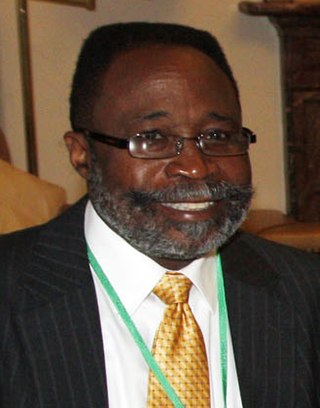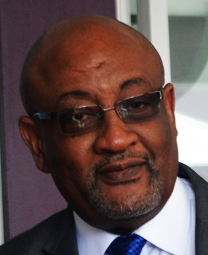
Daniel Orlando Smith, OBE is a British Virgin Islands politician and the former Premier of the British Virgin Islands from 2011 to 2019 and from 2003 to 2007. He also formerly served as Chief Minister of the British Virgin Islands from 2003 to 2007. He first won the office when his National Democratic Party won the 2003 general election, being the party's first victory at a general election in its history.

Elections in the British Virgin Islands are conducted to elect members to the House of Assembly. In the British Virgin Islands elections are not conducted in relation to appointments to either the Executive or Judicial branches of Government, and there are no other publicly elected posts in the British Virgin Islands. Most elections are conducted as general elections, which under the Constitution are required to be held every four years, or as by-elections when a member of the House of Assembly dies or steps down. Since the re-introduction of democracy into the British Virgin Islands in 1950 there have been fifteen general elections, and three recorded by-elections. The last election was held on 25 February 2019.
The National Democratic Party is a political party in the British Virgin Islands. In the 2019 general election the NDP was voted out of office; it most recently held power after winning the 2015 general election.
The Virgin Islands Party (VIP) is a political party in the British Virgin Islands. It is presently led by Natalio Wheatley. It is the oldest active political party in the British Virgin Islands, and it has won more general elections (seven) than any other political party in the British Virgin Islands.

The House of Assembly of the British Virgin Islands, until 2007 known as the Legislative Council, has 15 members: 13 directly elected for four-year terms, and two ex officio members.

Ralph Telford O'Neal, OBE was a British Virgin Islander politician. He was the longest ever serving elected representative in the British Virgin Islands, and served as Chief Minister or Premier of the British Virgin Islands for three terms.

Ruth Dancia Penn, is a British Virgin Islands politician and former Deputy Governor of the British Virgin Islands from 20 September 2004 to 1 April 2007. She also formerly served as the Attorney General of the British Virgin Islands from 1992 to 1999.
General elections were held in the British Virgin Islands on 20 August 2007. The result was a landslide victory for the opposition Virgin Islands Party (VIP) over the incumbent National Democratic Party (NDP).

General elections were held in the British Virgin Islands on 16 June 2003. It was won by the opposition National Democratic Party (NDP), which took 54.4% of the vote and 8 of the 13 available seats on the Legislative Council. After the election the NDP formed a Government for the first time in its history. Both major parties - the NDP and the Virgin Islands Party (VIP) actually increased their share of the overall vote at the expense of minority parties and independents. No independents or any minority parties won any seats. The NDP won all four of the territorial-at-large seats.

Politics of the British Virgin Islands takes place in a framework of a parliamentary representative democratic dependency, whereby the Premier is the head of government, and of a multi-party system. The British Virgin Islands are an internally self-governing overseas territory of the United Kingdom. The United Nations Committee on Decolonization includes the islands on the United Nations list of non-self-governing territories. The Constitution of the Islands was introduced in 1971 and amended in 1979, 1982, 1991, 1994, 2000 and 2007. Executive power is exercised by the government. Legislative power is vested in both the government and the House of Assembly. The Judiciary is independent of the executive and the legislature. Military defence is the responsibility of the United Kingdom.
General elections were held in the British Virgin Islands on 7 November 2011. The result was a decisive victory for the opposition National Democratic Party (NDP) led by Orlando Smith over the incumbent Virgin Islands Party (VIP), led by Premier Ralph T. O'Neal. No minor parties or independent candidates won any seats.
General elections were held in the British Virgin Islands on 12 November 1979. The result was a victory for the opposition Virgin Islands Party (VIP) led by former Chief Minister Lavity Stoutt over the incumbent United Party (UP) led by Willard Wheatley. The newly formed Virgin Islands National Movement (VINM), led by Elvin Stoutt, also contested the elections but did not win any seats.

Julian Fraser is a British Virgin Islander politician who formerly belonged to the opposition Virgin Islands Party in the British Virgin Islands, and in August 2018 formed a new party, Progressives United.
The People's Empowerment Party is a defunct political party in the British Virgin Islands, led by former House of Assembly member for the second district Alvin Christopher. Mr Christopher has previously been elected as a representative of the Virgin Islands Party, the National Democratic Party and as an independent. It has no elected representatives and may now be defunct.
General elections were held in the British Virgin Islands on 8 June 2015 to elect members to the House of Assembly. The result was a landslide victory for the incumbent National Democratic Party (NDP) over the opposition Virgin Islands Party (VIP). No minor parties or independent candidates won any seats. Unusually, every single incumbent candidate who stood in their original seat was victorious.

The Leader of the Opposition is the leader of the largest political party in the House of Assembly that is not in government.

General elections were held in the British Virgin Islands on 25 February 2019. For the first time, four parties with at least one incumbent member were contesting an election.
The Progressive Virgin Islands Movement (PVIM) is a political party in the British Virgin Islands. It is presently led by Ronnie Skelton.
Alvera Maduro-Caines is a British Virgin Islands politician. She is a ex member of the House of Assembly of the British Virgin Islands for the Sixth District, a position that she has held since the 2011 general election. She was originally elected as a representative of the National Democratic Party but in 2020, she crossed the floor to join the Virgin Islands Party. She is the current Junior Minister for Culture and Tourism.

General elections were held in the British Virgin Islands on 24 April 2023. The governing Virgin Islands Party (VIP) remained the largest party in the House of Assembly but lost its majority resulting in a hung parliament.









